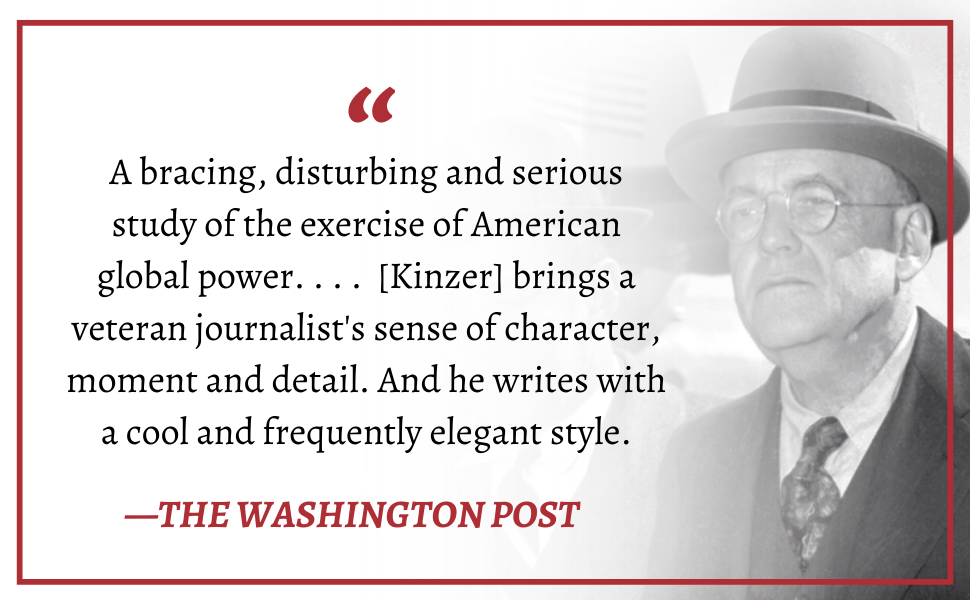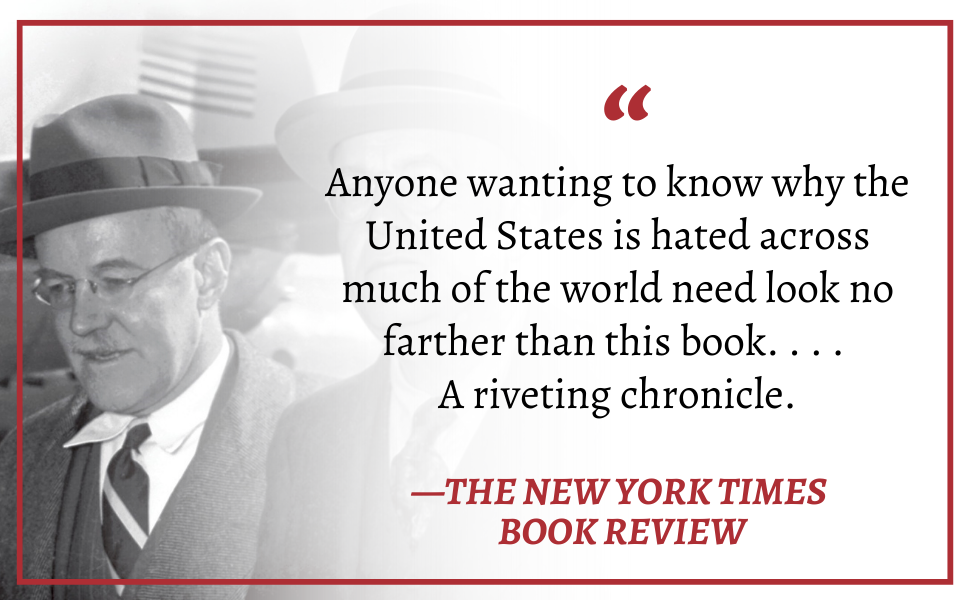Customer Services
Copyright © 2025 Desertcart Holdings Limited
Desert Online General Trading LLC
Dubai, United Arab Emirates



The Brothers: John Foster Dulles, Allen Dulles, and Their Secret World War


J**R
A Fantastic Book!
The book is fascinating and gripping. I couldn't put it down. It goes a long way in explaining the plight in which the United States finds itself today.The book's general focus is on the actions of the CIA and the State Department during the early period of the Cold War, specifically 1947 through the late 1960s and the role that the Dulles brothers played during that period of time. John Foster Dulles was serving as Secretary of State and Allen Dulles was serving as director of the CIA. The book specifically focuses on six regime-change operations during the Dulles brothers' tenure: Iran, Guatemala, Indonesia, Vietnam, Cuba, and the Congo, including the first presidentially authorized assassinations of foreign leaders in American history.We live in a time today when many Americans exalt the national-security state. They honestly believe that if it weren't for the big standing army, the overseas military empire, the CIA, and the NSA, the United States wouldn't exist for very long. Without the national-security state, these Americans honestly believe, America would quickly fall to the communists, the terrorists, the illegal aliens, the drug dealers, or some combination thereof.They sing the praises of the troops and automatically assume that the more people they kill over there, they safer we are here at home. They glorify the CIA, even while not knowing exactly what it's doing--and, more important, not wanting to know. They like the fact that the NSA is spying on them but would prefer not knowing that it's spying on them. They simply cannot imagine living the life that our American ancestors lived for more than a century and a half before World War II --a life without a national security state.Such Americans block out of their minds the fact that a free society and a national-security state are irreconcilable. In fact, they've convinced themselves that they're free because of the national security state.Books like Kinzer's help to pierce through the falsehoods and misconceptions about the military and the CIA that grip the minds of so many Americans. The book shows how the United States veered off into a different direction after World War II, a direction involving much dark-side activity that the national-security state kept secret from the American people and which the American people, for their part, simply didn't want to know about.It was all justified under fighting the communists or, more specifically, keeping America safe and secure from America's World War II partner and ally, the Soviet Union, which supposedly was orchestrating a worldwide communist movement designed to conquer and control the entire world.There was the CIA's coup in Iran, which ousted the popular Mohammad Mossadegh from power and reinstalled the brutal dictatorial regime of the Shah. There was the CIA's ouster of the democratically elected president of Guatemala and his replacement by a brutal military dictatorship. There was the CIA's instigation of a horrific civil war in Indonesia. There was the CIA's plan to assassinate the leader of the Congo. There was the CIA's coup and the assassination of the U.S.-appointed leader of South Vietnam. There was the CIA's invasion of Cuba and repeated assassination attempts on the life of Fidel Castro.Never mind that there were other factors involved, such as the nationalization of British oil interests in Iran or the nationalization of land in Guatemala belonging to a U.S. corporation with which the Dulles brothers had close ties. And never mind that Third World rulers simply wanted to stay out of Cold War politics. What mattered was that whenever any foreign ruler didn't do what U.S. officials wanted him to do, that made his regime a Cold War enemy and, therefore, subject to regime-change, including through assassination. The mindset was "If you're not with us, then you're against us." Neutrality was out of the question.And never mind that Americans and others around the world are still suffering the horrific results of these regime-change operations. Just look at the state of U.S.-Iran relations. Or the hundreds of thousands of graves in Guatemala as a result of the civil war that the CIA's coup brought about. Or the continuous brutal U.S. embargo against Cuba. Or the families who still grieve the loss of loved ones in Vietnam and here in the United States.It was all a new direction for America, a dark direction, one that the American people had never before engaged in. And it was all justified under the rubric of "the communist threat," specifically the supposed danger that the communists were everywhere and were coming to get us and take over our country, much like we hear about the terrorists today.Why is this early period of the Cold War so relevant to today? Because the foreign policy-civil liberties woes that America faces today are rooted in that period. That's why that an understanding of that period is so critically important to understanding what we need to do to extricate ourselves from the morass in which we find ourselves. Restoring the right direction for our nation, a direction based on sound moral, economic, and legal principles, necessarily entails an examination of where American went wrong after World War II.Another great book about this period is The War State: The Cold War Origins Of The Military-Industrial Complex And The Power Elite, 1945-1963 by Michael Swanson. That book provides the best summary of the military component of the national-security state during the Cold War. If you read both books--The War State and The Brothers -- you will have an almost perfect understanding of how we got into this mess, what the mess has done to our nation, and what we need to do to get out.--Jacob Hornberger, president, The Future of Freedom Foundation
G**N
Shane . . . Shane . . . Come Back Shane!
This book is a rollercoaster ride; it has its ups and its downs. Structured as a short (328 pages of text) joint biography, it focuses on the covert activities that were guided by the Dulles brothers in their roles as Secretary of State and as director of the Central Intelligence Agency in the 1950s. The author brings to this task the writing skills of an experienced journalist. The book is well written and highly readable.John Foster and Allen Dulles were both intelligent, but differed in personality. John Foster was hard working and serious. Allen was more sociable and somewhat unscrupulous. Both brothers became lawyers, and both joined Sullivan & Cromwell, a prominent New York law firm. With the advent of the Second World War, Allen joined the Office of Strategic Services, and Foster became a political leader in the Republican Party. When North Korea invaded South Korea in 1950, Allen went to work as the deputy director of operations in the Central Intelligence Agency. Foster was appointed adviser to the Secretary of State.At about this point, I began to experience substantial doubt about the validity of many of the opinions asserted by the author. Sullivan & Cromwell is repeatedly presented as a sinister entity, at odds with the best interests of the United States. I know Sullivan & Cromwell. It is a law firm – a good one. It is comprised of exceptionally talented lawyers who work hard. It is not the sinister entity pictured in this book. The international threat of communist Russia is labeled “illusory.” There was nothing illusory about the trumped up trial of Cardinal Josef Mindszenty in Hungary in the late 1940s. His face stared out at you from every newspaper and every newsreel for several years. It was our first brush with the techniques of brainwashing. But Mindszenty is not even mentioned. The movies “Shane” and “High Noon” are presented as reinforcing a cultural consensus that America was doing the right thing in its international efforts to ensure the triumph of justice. There is no mention of Solzhenitsyn or the Gulag, or any other example of Soviet communist brutality.The dust jacket states that the book asks why the United States behaves as it does in the world. The book presents an interesting analysis of the way that the Dulles brothers responded to the efforts of third-world nations that were seeking independence from established colonial powers. In particular, the author focuses on six third-world leaders that the Dulles brothers thought were “monsters:” Mossadegh, Arbenz, Ho Chi Minh, Sukarno, Lumumba, and Castro. The covert activities of the CIA against each of these monsters are described in summary fashion. The reasoning is subject to dispute, but the importance of the subject matter is obvious.This book is a good start for a review of the covert activities conducted by the CIA under the colors of the United States.
S**R
The Power.
The Brothers is a powerful and well-executed work of narrative history. Stephen Kinzer offers a penetrating look into the lives of two men who operated at the highest levels of secrecy and influence, often unchecked. It’s essential reading for anyone interested in the roots of American empire, the Cold War, and the hidden levers of geopolitical power.Rating: (5/5)An excellent and sobering account of how two brothers shaped—and misshaped—the modern world.
Trustpilot
1 month ago
2 weeks ago